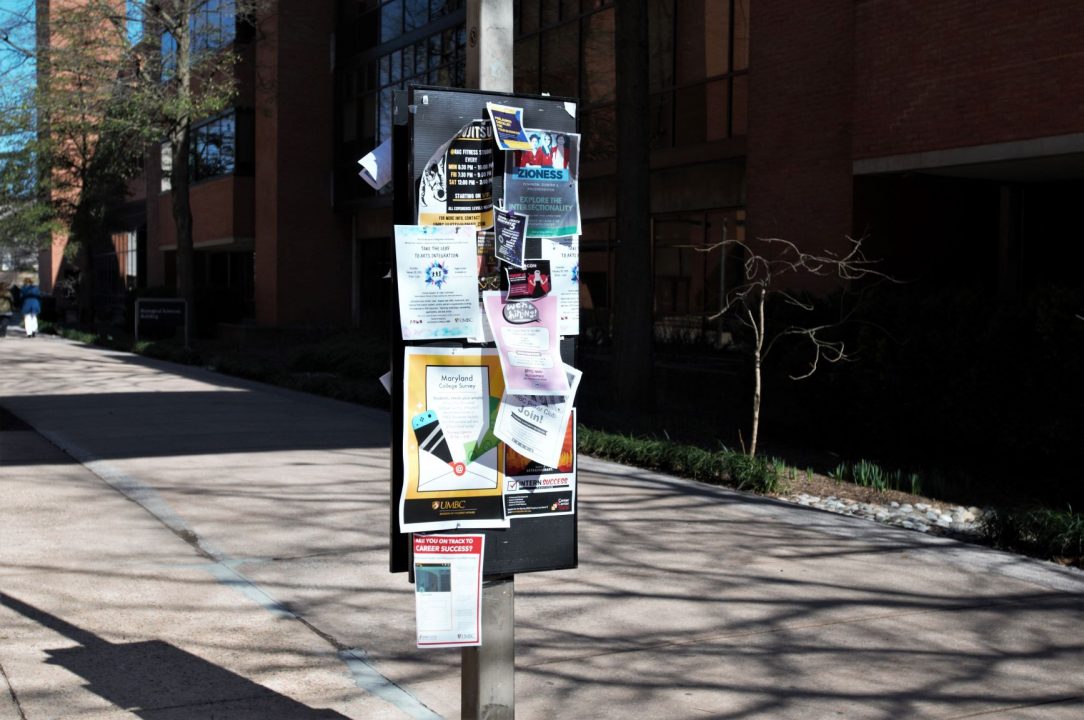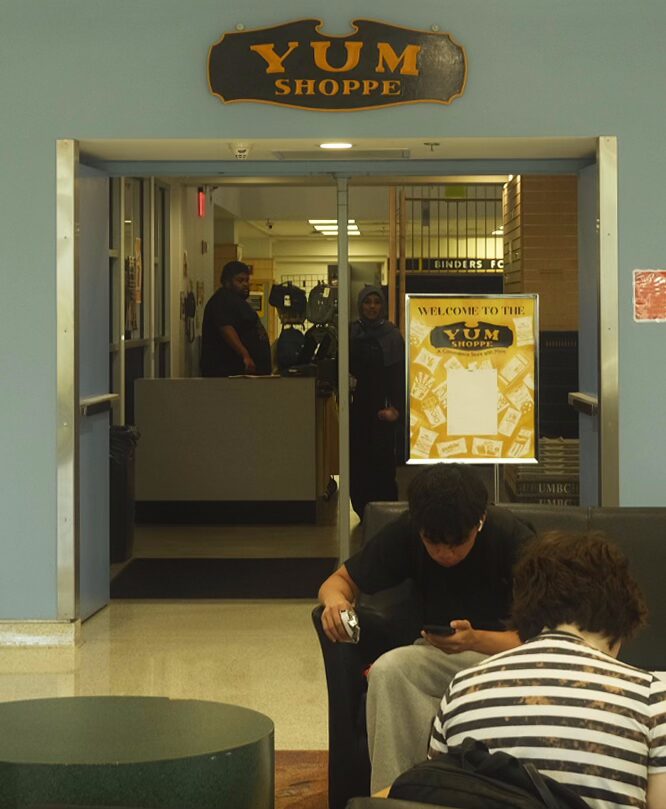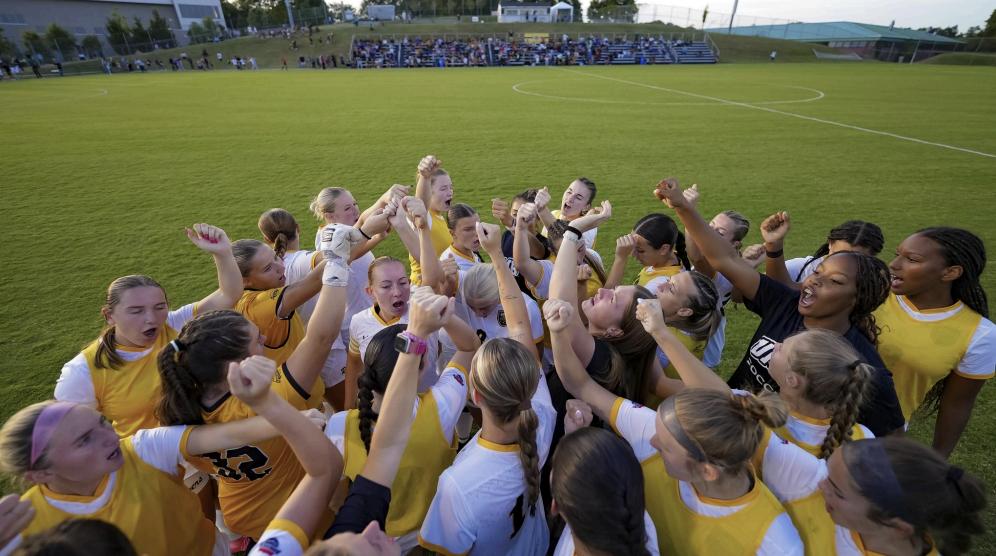Have you ever posted something on the Math/Psychology Building’s ground floor bulletin boards?
Have you ever wondered if you were going against campus policy in doing so?
Phone calls to the math department, psychology department and facilities management determined that none of these departments regulated the bulletin board in the Math/Psychology Building.
Though students may assume that those bulletin boards are monitored by facilities management or an academic department, they are in fact unregulated, a phenomenon outlined in item four of the current iteration of the University of Maryland, Baltimore County’s posting policy.
While the university posting policy may seem jargonistic and dull, one man has made it his mission — or, more accurately, his job description — to begin the arduous process of sifting through university policies and updating them as changes on campus occur.
It is “really a continuous process,” said Joel DeWyer, the associate director for Campus Life Operations and the policy reviewer. UMBC’s posting policy is the last document in a wide list of policies that Student Affairs handles and revises. “With some of the new activism or the rebirth of activism that we’re seeing on a lot of college campuses, we’re looking at policies that we just reviewed and approved a year ago,” DeWyer continued.
DeWyer works closely with Event and Conference Services and Campus Life Facilities and Operations, which manage The Commons, the third floor of the University Center and the Fine Arts Recital Hall, and provide support to the Pride Center and the Interfaith Center. These departments oversee the three cylindrical kiosks located in The Commons, which are managed daily by the Campus Information Center. The posting boards along Academic Row are maintained by Facilities Management, and Off Campus Student Services manages their own bulletin board at the south entrance to The Commons.
DeWyer does not have an exact number of how many posting boards are scattered across campus, as some are departmentally controlled. There are also no exact numbers for how many unregulated posting boards, like the one in the Math/Psychology Building, exist on campus.
But print advertising seems to be moving digital, DeWyer said. Student organizations are sharing events on social media or using iNet, a digital signage service offered by Commonvision.
Additionally, “orgs are telling us all the time that word of mouth is by far their most effective form of advertising for the thing that they’re doing,” DeWyer said.
As advertising changes, DeWyer is hoping the new policy fills the gaps to continue to remain relevant and informative. To do so, DeWyer, along with a policy review committee, will look at university best practices for postings, as well as address any posting questions that have been asked at UMBC in recent years, before sending any changes to the Office of the General Counsel. From there, the updated policy can be approved.
Despite the potential updates, DeWyer said that his office is not looking to censor anyone’s posts, although he clarified that priority is given to campus-based events if space is limited.
“If we see something that’s controversial content, that’s not our concern,” DeWyer said. “As long as it has the basic pieces that it should have and it’s not promoting something illegal or threatening someone or some group, then it’s going to get posted, as space is available.”
These “basic pieces,” as DeWyer calls them, require any proposed advertising or posting to include the name and phone number or email of the sponsoring individual or organization as well as the date and time of the meeting or activity.
Like Campus Life, Residential Life has its own posting policy for any advertisements in the residential halls. This policy is “more specific than general campus policy,” according to Residential Life Director John Fox, which, to him, helps maintain the home-like nature of the residential halls.
“We want to support flyers that students groups send, but we have to have an eye for anything that is not in line with institutional excellence values,” Fox said. “We’re not here to censor images or language, but we also know language can negatively harm students.”
Unlike Campus Life, Residential Life relies on print flyers to get information out to students, according to Ashley Copenhaver, the president of the Resident Student Association. Residential Life recently stopped sending email blasts to the residential student population about upcoming events, something that has prompted the RSA to take a second look at their social media presence and double down on print flyers.
“Sending emails was our main method of getting people to come to our events,” Copenhaver said. “Our numbers and our attendance have dropped a lot. Posting is the only way we can really advertise now.”
The biggest issue Copenhaver faces when it comes to print advertising is the timeliness of posting by residential assistants.
“It’s a responsibility of the RA [to post flyers on their floor], but sometimes life happens,” Copenhaver said. “It’s an invisible piece for us, whether those flyers are getting hung up or not.”
But how do UMBC’s posting policies stack up nationally?
The Foundation for Individual Rights in Education, a non-profit educational foundation based in Philadelphia that aims to defend individual rights at American colleges and universities, rates those institutions based on their constitutional viability according to a traffic light system.
Currently, according to an email communication with Laura Beltz, a senior program officer for policy reform at FIRE, UMBC “would earn a ‘yellow light’ rating” for its posting policies due to a “lack of clarity about posting … [that is] pretty common across universities.” Of the four universities from Maryland that have been assessed, only one — the University of Maryland, College Park — holds a green light rating.
“Of the 471 colleges we include in the Spotlight database,” Beltz wrote, “195 include at least one yellow light rated [posting policy].”
But maybe none of this matters at all.
“My prediction is, in a few years, those physical postings will disappear because no one will want to use them anymore, but we’ll see,” DeWyer said. “Time will tell.”
Correction: The online and print version of this article incorrectly stated that Campus Life manages the posting boards along Academic Row. Facilities Management maintains those boards.



